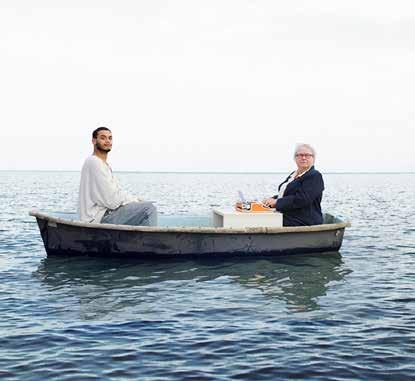
4 minute read
Stage
from February 26, 2020
by Ithaca Times
stage A Successful Pair
Two local plays carried by music, acting By Barbara Adams I thaca College brought the splendid music of Henry Purcell to the stage last weekend in its elaborate mainstage production of his Baroque opera “Dido and Aeneas.” Possibly composed for a London girls’ school around 1687, this work, based on Virgil’s “Aeneid,” relates the ill-fated romance of the defeated queen of Carthage, Dido, and the Trojan hero, Aeneas, who must leave her to sail north, where he’s destined to be the progenitor of the Romans. shifts moodily. Juniors Brittany DaggettDuffy (set) and Melanie Spiel (lighting) fashion this unique ambience. At first the setting looks like a British beach, but as the towers are moved about and swarmed over, they suggest the Trojan horse or even a more abstract sense of mutability, cenotaphs presaging Dido’s death.
Advertisement
A prologue introduces us to the gods of sun, sea, and finally love, who holds all under her sway. Their costumes, by Greg Robbins, mix classical and much later Eued a bit stiffly, but once the main narrative began, everyone seemed to relax into their roles. And the singing throughout –– supported by Christopher Zemliauskas’ string orchestra, complete with harpsichord and guitars –– was excellent, showcasing the skill of the music school’s artists.
Nine roles were rotated over the weekend, so this review can only acknowledge the opening cast, with Lucas Hickman’s heroic-looking, well-sung Aeneas and Sarah Aliperti’s aptly distressed Dido. Supporting the queen were her ladies, vividly rendered by Olivia Schechtman and Syona Ayyankeril.
The evil sorceress, envious of the beautiful and powerful, thus determined to take Dido down, was richly embodied by Lindsey Weissman, flanked by her cackling accomplices (Jessica Laddin and the mischievous Madison Hoerbelt), whose comical dances were delightful.
The witches, a 17th-century addition to the legend, create amusing stage busi
Sarah Aliperti and Lucas Hickman portray Dido and Aeneas, respectively, in the Ithaca College production of the storied opera. (Photo provided)

The Cherry débuts On the Other Side of the Sea, by Salvadoran writer Jorgelina Cerritos.
Mythological origins of empire often being fantastical, director Norm Johnson has free rein to stage the story imaginatively. The stage is dominated by three colossal, multi-platformed wooden towers; behind these, across a scrim like an enormous stretched goatskin, a cloudy sky ropean styles. He clothes the large chorus, or populace, in off-white peasant garb, hooded and almost ragged; in later scenes these followers literally unfurl themselves wondrously to become sails and part of the storm itself.
On opening night, the prologue unfold

ness, sending a fake Mercury to command Aeneas to leave; duty calls, and his abandoned Dido will die of grief. Alas, the plot and intricate motivation are reduced to the broadest of strokes, or what we can intuit from the actors’ physical responses––since the lyrics of Nahum Tate’s libretto are 95 percent incomprehensible. From time to time repeated phrases leak through, but listening is like looking at a cuneiform tablet: a pretty pattern whose meaning remains, to most of us, obscure.
Even English operas need supertitles, otherwise a key element of the work––narrative, nuanced details, and lyrical language itself––is lost.
What triumphs in this production, though, is the exquisite music, handsomely conveyed by both vocal and instrumental performers.
Another, more intimate seaside tale unfolds at The Cherry (through March 1), in Salvadorean playwright Jorgelina Cerritos’ “On the Other Side of the Sea.” Also magical-mythical, this story unfurls almost like a children’s tale, simple in dialogue and design.
Almost half the theatre is taken up by the set, 15 multileveled sun-bleached linked wooden platforms wedged into a corner of the space, the top one featuring a battered office desk and chair. A huge triangular white cloth sweeps upward on one wall, suggesting a sail, and an old dinghy hangs upright on another. (The calming coastline environment is shaped by Daniel Zimmerman and Christopher Brusberg.) Artistic director Sam Buggeln, committed to producing international works, directs this English language premiere; scholars Margaret Stanton and Anna Donko provide the translation. Two actors only are needed for the roles: an aging white female bureaucrat consigned to an isolated office near a beach and a young man of color, nameless, homeless, seeking travel papers.
He’s relentlessly polite, cheerful and positive, but unafraid to speak frankly; she’s pressed, preoccupied, and negative, a fortress against feeling and anything not official or routine. She types nonstop, seeking meaning in busy-ness; he interrupts her constantly, pursuing the paperwork that will allow him to travel freely. A birth certificate, for a start––but having no history at all, he names himself Fisherman of the Sea, his birthdate being that very day, when he will legally begin to exist.
The exiled government employee can’t bear his rambling, his unconventionality, but gradually, of course, she is lured––to listening, to inventing his certificate, to swimming freely in the ocean, to returning to her own humanity.
Susannah Berryman and Jahmar Ortiz perfectly embody the antithetical duo, the workhorse and the wanderer. Her defensive crotchetiness gradually gives way to curiosity and memory-stirred emotion; his always-in-the-moment ease slips to show the sadness and longing just beneath the surface. Childlike, he has hope of sailing back to the other shore, where he’s promised an impounded dog he’ll return to to adopt him.
In this immigration tale, displaced strangers inexorably become connected. The dialogue is sometimes more simple and repetitive than poetic, but the actors’ commitment pulls us in. When the two affirm their individual freedom and friendship with a dip in the ocean, projections of cut-out figures (courtesy of The Stringpullers) swim hypnotically across the wall. The effect, both in this moment and accruing throughout, is of a genuine peacefulness.
Barbara Adams, a regional theatre and arts writer, teaches writing at Ithaca College.




